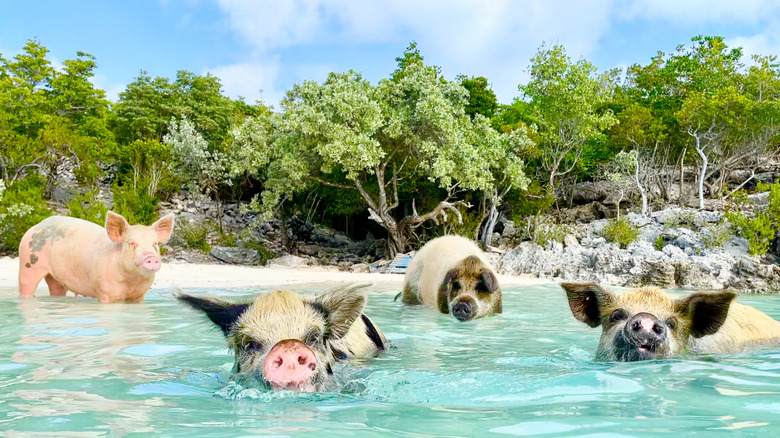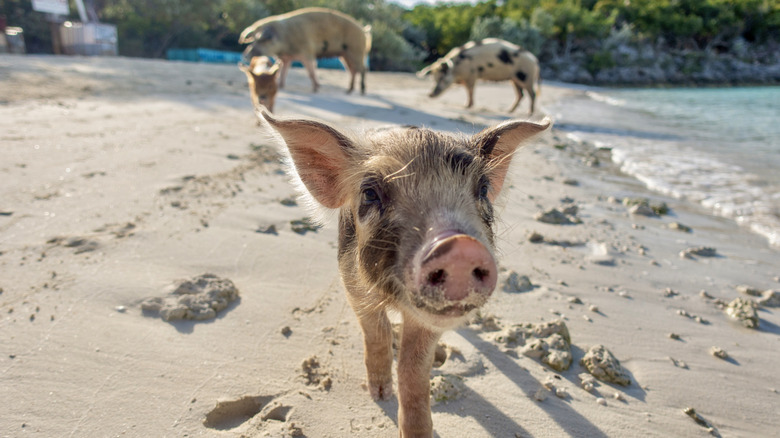The Unsettling Reasons Why Swimming With Pigs In The Bahamas Can Be Dangerous
If you've ever scrolled Instagram and seen someone grinning next to a swimming pig in turquoise water, chances are it was at the beaches of Big Major Cay, also known as Pig Beach. This one-of-a-kind swimming experience on the popular Caribbean island Exuma has skyrocketed in popularity over the past decade, becoming a hit with visitors excited to wade, feed, and pose with the now-famous beach-loving pigs. But what's less visible behind the photo ops is the darker — even dangerous — side of this experience.
First off, these wild pigs, often weighing hundreds of pounds, are not the cute, little pink piglets often seen on social media. They can be aggressive, especially when food is involved, and tourists can get nipped, bitten, or seriously injured. One traveler on Reddit said they were bitten while swimming with the pigs, resulting in an infection that required antibiotics and a series of rabies shots. Their size and strength can also be underestimated by tourists, and can be dangerous for weak swimmers.
Despite the beautiful setting, animal welfare experts and conservationists have also raised serious concerns about the effects this has on the pigs themselves. These animals weren't always here — their origins are murky, with theories ranging from the pigs being shipwreck survivors to sailors keeping them for food. Regardless of how they got to the island, they're now more dependent on humans, as their natural foraging behaviors have changed in response to so much human interaction. In another human-pig encounter, several pigs died in 2017 after ingesting sand, which could have happened while eating food tossed to them by tourists.
What tourists should know before swimming with pigs
While swimming with pigs may seem harmless, there are several reasons you may want to think twice about it. For starters, any animal encounter created for tourist amusement, like swimming with wildlife, has the potential to cause stress and exhaustion for the animals. Also, without shade or mud to protect their sensitive skin, pigs can get severe sunburns and skin conditions. Plus, you can also safely bet you're participating in an activity that gets the pigs killed eventually. One past visitor, blogger Michelle Cehn from World of Vegan, reported that a local confirmed the pigs are culled to prevent overpopulation.
Sanitation is also a factor. These are wild animals, and you'll be swimming with both pigs and their poop during the experience. Getting in with open cuts or ingesting the water could lead to illness or infection. For example, a 74-year-old man developed severe cellulitis after swimming with Bahamian pigs, per the National Library of Medicine. A woman in New York said she suffered from a parasitic infection for six years after close contact with a piglet on Paradise Island (via CruiseRadio).
Ultimately, the experience is only as ethical and safe as the tour provider. Some are better than others, considering so many spur-of-the-moment copycat operations have popped up in recent years. If you're set on swimming with the pigs, be sure to look into the tour operator first, and don't feed them anything that is not approved by the caretakers. It might be a good idea to skip the selfies, too. Usually, the best way to respect wildlife is to admire it from a distance. But with so many amazing things to do in the Bahamas, like camping right on the ocean in literal paradise, we'd just as soon skip these kinds of touristy gimmicks.

